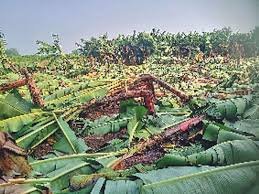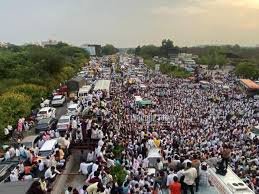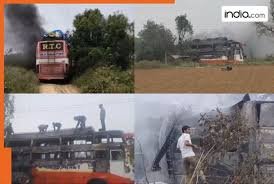
Unseasonal rains cast a shadow on Diwali celebrations; Maize ears sprouted, cotton slivers turned black, farmers' income zero
Chhatrapati Sambhajinagar, October 29, 2025 (Special Representative) Unseasonal rains have brought dark clouds of despair on the faces of farmers during the bright days of Diwali. By destroying the Kharif season crops that were close to hand, unseasonal rains have ruined the lives of farmers. The heavy rains that began in Sillod, Phulambri, Kannada and Soygaon talukas of Chhatrapati Sambhajinagar district since Tuesday (October 28) have completely destroyed major crops including maize, cotton, soybean, tur, millet and ginger. Due to the water accumulated in the fields, maize ears sprouted on the spot, and cotton ready for harvesting has become slivers, and its quality has deteriorated greatly. Due to this, the income of the farmers has come to nil, and the debt-ridden farmers are now facing the crisis of hunger.
This unseasonal rain has become a double crisis for the farmers in the backdrop of Diwali. On the one hand, while preparations are underway for the festive shopping and celebrations, on the other hand, the farmers are frustrated by the damage in their fields. The average rainfall intensity in the district has reached 50 to 70 millimeters, and in some places it has even exceeded 100 millimeters. According to the warning given by the Meteorological Department, this rain is likely to continue till October 31, which is likely to increase the damage further.
A frightening picture in Sillod taluka
The unseasonal rain has hit Sillod taluka with the greatest intensity. The rains that started on Tuesday morning caused great damage to the farmers of the taluka. In group number 312 of Ambhai village, farmer Mazhar Deshmukh's buffalo and ox were killed in the rainstorm in his field. Deshmukh said, "I wanted to save some money for Diwali, but now everything is gone. The corn ears have sprouted in the field. Cotton was harvested, but now it is unsellable. How can I repay the loan?" He expressed his regret. Farmers in Ambadve, Daundi and Mohada villages of the taluka have also suffered huge losses. The fodder of the animals in the fields has soaked and rotted, and farmers who rear livestock are also facing a crisis.
Heavy rains in Phulambri have wiped out farmers' bankruptcies
Unseasonal rains wreaked havoc in Phulambri taluka since Tuesday morning. Heavy rains fell in the villages of Pulambri, Talegaon, Pirbavda, Nidhona, Wakod and Vadodbazar. Ramesh Patil, a farmer here, said, "The soybean harvest was left, but everything was ruined by the rain. The ginger has turned yellow, and the millet grains have mixed with water. I wanted to make my family happy by selling it in the Diwali market, but now how can I take care of my family?" More than 500 farmers in the taluka have suffered losses, and the loss is estimated to be more than Rs 10 crore. Although the local administration has announced immediate assistance, the farmers feel that it is insufficient.
Flood-like picture in Kannada taluka
Unseasonal rains have been wreaking havoc in Kannada taluka for a week. Heavy rains fell in Chincholi Limbaji, Nagad, Pishore and Chapaner areas. Speaking to Lokmat, farmer Vitthalrao Jadhav said, "Water accumulated in the maize field and the ears of corn burst. The cotton was scorched and became unfit for sale in the market. Tur and millet crops were also completely destroyed. Such incidents are increasing due to climate change, but why are the government not taking appropriate measures?" Rivers and streams in the taluka are flowing, and some villages have been flooded. The district administration has kept NDRF teams ready and is preparing to displace farmers.
7-hour rain lashed the city in Soygaon
The rain that started at 7 am in Soygaon taluka lashed the city for 7 hours continuously. Rivers flooded in Soygaon, Jarandi, Ghosla and Banoti areas. Sanjay Deshmukh, the leader of the farmers' organization here, said, "70 percent of the farmers have suffered losses due to the unseasonal rain. Maize and cotton, the main crops, have been destroyed, and the farmers should be compensated immediately. Otherwise, an agitation will be launched." 80 percent of the agricultural area in the taluka has been damaged, and the production of ginger and soybeans has come to nil.
Chhatrapati Sambhajinagar, October 29, 2025 (Special Representative) Unseasonal rains have brought dark clouds of despair on the faces of farmers during the bright days of Diwali. By destroying the Kharif season crops that were close to hand, unseasonal rains have ruined the lives of farmers. The heavy rains that began in Sillod, Phulambri, Kannada and Soygaon talukas of Chhatrapati Sambhajinagar district since Tuesday (October 28) have completely destroyed major crops including maize, cotton, soybean, tur, millet and ginger. Due to the water accumulated in the fields, maize ears sprouted on the spot, and cotton ready for harvesting has become slivers, and its quality has deteriorated greatly. Due to this, the income of the farmers has come to nil, and the debt-ridden farmers are now facing the crisis of hunger.
This unseasonal rain has become a double crisis for the farmers in the backdrop of Diwali. On the one hand, while preparations are underway for the festive shopping and celebrations, on the other hand, the farmers are frustrated by the damage in their fields. The average rainfall intensity in the district has reached 50 to 70 millimeters, and in some places it has even exceeded 100 millimeters. According to the warning given by the Meteorological Department, this rain is likely to continue till October 31, which is likely to increase the damage further.
A frightening picture in Sillod taluka
The unseasonal rain has hit Sillod taluka with the greatest intensity. The rains that started on Tuesday morning caused great damage to the farmers of the taluka. In group number 312 of Ambhai village, farmer Mazhar Deshmukh's buffalo and ox were killed in the rainstorm in his field. Deshmukh said, "I wanted to save some money for Diwali, but now everything is gone. The corn ears have sprouted in the field. Cotton was harvested, but now it is unsellable. How can I repay the loan?" He expressed his regret. Farmers in Ambadve, Daundi and Mohada villages of the taluka have also suffered huge losses. The fodder of the animals in the fields has soaked and rotted, and farmers who rear livestock are also facing a crisis.
Heavy rains in Phulambri have wiped out farmers' bankruptcies
Unseasonal rains wreaked havoc in Phulambri taluka since Tuesday morning. Heavy rains fell in the villages of Pulambri, Talegaon, Pirbavda, Nidhona, Wakod and Vadodbazar. Ramesh Patil, a farmer here, said, "The soybean harvest was left, but everything was ruined by the rain. The ginger has turned yellow, and the millet grains have mixed with water. I wanted to make my family happy by selling it in the Diwali market, but now how can I take care of my family?" More than 500 farmers in the taluka have suffered losses, and the loss is estimated to be more than Rs 10 crore. Although the local administration has announced immediate assistance, the farmers feel that it is insufficient.
Flood-like picture in Kannada taluka
Unseasonal rains have been wreaking havoc in Kannada taluka for a week. Heavy rains fell in Chincholi Limbaji, Nagad, Pishore and Chapaner areas. Speaking to Lokmat, farmer Vitthalrao Jadhav said, "Water accumulated in the maize field and the ears of corn burst. The cotton was scorched and became unfit for sale in the market. Tur and millet crops were also completely destroyed. Such incidents are increasing due to climate change, but why are the government not taking appropriate measures?" Rivers and streams in the taluka are flowing, and some villages have been flooded. The district administration has kept NDRF teams ready and is preparing to displace farmers.
7-hour rain lashed the city in Soygaon
The rain that started at 7 am in Soygaon taluka lashed the city for 7 hours continuously. Rivers flooded in Soygaon, Jarandi, Ghosla and Banoti areas. Sanjay Deshmukh, the leader of the farmers' organization here, said, "70 percent of the farmers have suffered losses due to the unseasonal rain. Maize and cotton, the main crops, have been destroyed, and the farmers should be compensated immediately. Otherwise, an agitation will be launched." 80 percent of the agricultural area in the taluka has been damaged, and the production of ginger and soybeans has come to nil.
This unseasonal rain has become a double crisis for the farmers in the backdrop of Diwali. On the one hand, while preparations are underway for the festive shopping and celebrations, on the other hand, the farmers are frustrated by the damage in their fields. The average rainfall intensity in the district has reached 50 to 70 millimeters, and in some places it has even exceeded 100 millimeters. According to the warning given by the Meteorological Department, this rain is likely to continue till October 31, which is likely to increase the damage further.
A frightening picture in Sillod taluka
The unseasonal rain has hit Sillod taluka with the greatest intensity. The rains that started on Tuesday morning caused great damage to the farmers of the taluka. In group number 312 of Ambhai village, farmer Mazhar Deshmukh's buffalo and ox were killed in the rainstorm in his field. Deshmukh said, "I wanted to save some money for Diwali, but now everything is gone. The corn ears have sprouted in the field. Cotton was harvested, but now it is unsellable. How can I repay the loan?" He expressed his regret. Farmers in Ambadve, Daundi and Mohada villages of the taluka have also suffered huge losses. The fodder of the animals in the fields has soaked and rotted, and farmers who rear livestock are also facing a crisis.
Heavy rains in Phulambri have wiped out farmers' bankruptcies
Unseasonal rains wreaked havoc in Phulambri taluka since Tuesday morning. Heavy rains fell in the villages of Pulambri, Talegaon, Pirbavda, Nidhona, Wakod and Vadodbazar. Ramesh Patil, a farmer here, said, "The soybean harvest was left, but everything was ruined by the rain. The ginger has turned yellow, and the millet grains have mixed with water. I wanted to make my family happy by selling it in the Diwali market, but now how can I take care of my family?" More than 500 farmers in the taluka have suffered losses, and the loss is estimated to be more than Rs 10 crore. Although the local administration has announced immediate assistance, the farmers feel that it is insufficient.
Flood-like picture in Kannada taluka
Unseasonal rains have been wreaking havoc in Kannada taluka for a week. Heavy rains fell in Chincholi Limbaji, Nagad, Pishore and Chapaner areas. Speaking to Lokmat, farmer Vitthalrao Jadhav said, "Water accumulated in the maize field and the ears of corn burst. The cotton was scorched and became unfit for sale in the market. Tur and millet crops were also completely destroyed. Such incidents are increasing due to climate change, but why are the government not taking appropriate measures?" Rivers and streams in the taluka are flowing, and some villages have been flooded. The district administration has kept NDRF teams ready and is preparing to displace farmers.
7-hour rain lashed the city in Soygaon
The rain that started at 7 am in Soygaon taluka lashed the city for 7 hours continuously. Rivers flooded in Soygaon, Jarandi, Ghosla and Banoti areas. Sanjay Deshmukh, the leader of the farmers' organization here, said, "70 percent of the farmers have suffered losses due to the unseasonal rain. Maize and cotton, the main crops, have been destroyed, and the farmers should be compensated immediately. Otherwise, an agitation will be launched." 80 percent of the agricultural area in the taluka has been damaged, and the production of ginger and soybeans has come to nil.

.jpg)
















